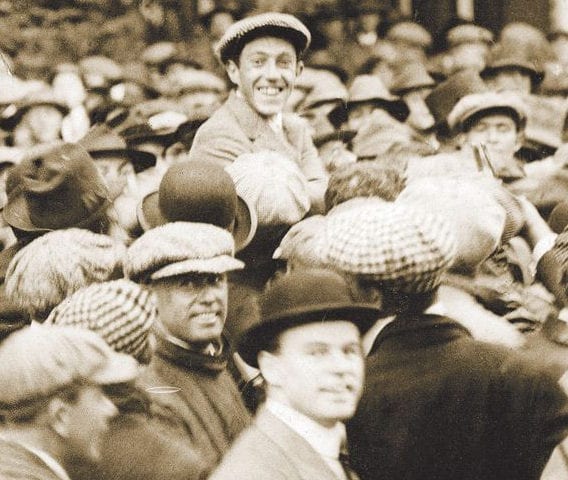They were the shots heard ’round the world,’ and they, too, started a revolution. At the 1913 U.S. Open at The Country Club, Francis Ouimet, a 20-year-old former caddie, didn’t just beat British legends Harry Vardon and Ted Ray; he changed the perception of an entire sport.
Ouimet’s stunning triumph captured the imagination of sports fans across the globe, sweeping away the notion that golf was a stuffy game for the old and rich. Ouimet was American golf’s first great hero, and he remains one of the most beloved figures in the sport’s history.
Ouimet seemed to step from the pages of a Dickens novel. He had grown up across the street from The Country Club in a working-class home and learned the game with the one old club his older brother, Wilfred, had procured as a caddie. The two boys built three makeshift holes in the family backyard, incorporating a gravel pit, a swamp, a brook and a patch of long, rough grass. Sunken tomato cans were used as cups. At 11, Ouimet began caddying at The Country Club, and by his later teens, he had begun to make a name for himself in tournament competition. After winning the 1913 Massachusetts State Amateur Championship, Ouimet was inspired to enter the National Open.
After three rounds he somehow found himself tied with Vardon, a four-time winner of the British Open, and reigning British Open champion Ray, whose walrus mustache and length off the tee were equally outsized. During the tense final round both Englishmen stumbled home with 79s, and, after a jittery 43 on the front nine, Ouimet joined their playoff by birdieing the 71st hole.
The following day, all three men went out in 38, and Ouimet took his first lead when Vardon and Ray three-putted the par-3 10th. By the par-4 17th Ray had given up the fight but Vardon was only one behind when he caught a bunker with his drive and took bogey. Ouimet then drilled a 15-foot birdie putt to put the championship on ice and endear himself to the world, with a little bit of help from his 10-year-old caddie, Eddie Lowery, a pintsized neighborhood kid who added a touch of whimsy to the photographs.
Ouimet proved he was no fluke by winning the 1914 U.S. Amateur, but when he subsequently opened a sporting goods shop he was banned from amateur competition by the USGA, a miscarriage of justice that was later reversed. Ouimet returned to play on the inaugural Walker Cup team in 1922 and the seven that followed, serving as captain in four more thereafter.
In 1931, his temples specked with gray, he won another U.S. Amateur at age 38. Ouimet was an important international figure as well. In 1951, he became the first American to captain the Royal and Ancient Golf Club at St. Andrews. His legacy transcends tournament victories. In 1913 it is estimated only 350,000 Americans played golf. Ten years later, fueled by Ouimet’s heroics, that number was up to 2,000,000. So it is that Ouimet is rightfully called the Father of American Golf. In 1963, the U.S. Open was again held at The Country Club to commemorate the 50th anniversary of his victory.
Said Ouimet in 1932, “To me, the ground here is hallowed. The grass grows greener, the trees bloom better, and there is even warmth to the rocks. Somehow or other the sun seems to shine brighter on The Country Club than any other place that I have ever known.” He died in nearby Newton in 1967. (http://www.worldgolfhalloffame.org/francis-ouimet/)

